- Home
- Elizabeth George
The Punishment She Deserves Page 7
The Punishment She Deserves Read online
Page 7
The fact that their home was called Cardew Hall was the only part of the tour that was true. The place had always been Cardew Hall, although Ding’s mum knew nothing of a single ancestor who might have lived in it, having herself inherited the virtual pile of rubble from a childless great-uncle and also having made the completely mad decision not to unload it at once onto an entrepreneur eager to turn it into a Relais & Châteaux hotel.
So because of all this and, more, because of the family’s desperate need for funds to repair the plumbing, restring the electrical wiring, modernise the kitchen and the bathrooms, and rid the entire rubbish tip of mold, mildew, and more pests than one could begin to enumerate, Ding was forced to show up two afternoons each week during summer term and every single afternoon during summer hols, and do her daughterly duty by keeping her post at the front door. While she despised every moment that she had to do this, it was the deal she’d made with her mother: Ding could enjoy the freedom of living-in accommodation in Ludlow provided that she returned on the afternoons when Cardew Hall was open to view. But the entire experience always put her on edge.
She was looking for some kind of respite when she got back to Ludlow, but when she reached the house in Temeside, she knew it was going to be difficult if not impossible to achieve that inside the place. For she recognised the Volvo parked mostly on the pavement in front of the house, and she realised that Finn Freeman’s mum had decided to drop by. Knowing that a visit from her would result in a row—because it always did whenever Finn spoke to his mum—Ding decided to seek a few minutes of peace by the river. She knew just the place: up along the way at Horseshoe Weir. There, from the pavement above, she’d be able to look down on the pool. As waterfowl had taken up residence with spring’s arrival, she might manage a glimpse of ducklings. Ducklings always improved her spirits.
That was how she ended up catching sight of Brutus and Allison Franklin, lip-locked on the River Teme with their kayaks lashed together to make the lip-locking easier. Her afternoon had been the camel. Seeing Brutus and Allison was the straw.
She felt something fracture within her. Brutus was supposed to be the one person in her life whom she could rely on now that Missa was gone from Ludlow. Yes, yes, even to believe that was completely ridiculous since he’d told her from the first that they would only be friends with privileges. But when she’d agreed to that plan, she’d also assumed that he wouldn’t be seeking “privileges” with anyone else, let alone doing so less than two hundred yards from the home he lived in. The home he lived in with her, with Ding.
She was staring at the two of them—Brutus and the loathsome Allison—when a car’s alarm began blaring just nearby. This caused several of the mallards to squawk and take flight. In the river, Brutus and Allison parted and, as luck would have it, Brutus caught sight of Ding. She spun round to leave, only to hear his friendly call of, “Hey! Dingster! How did it go this time?”
She spun back to the sight of him and to the sight of Allison looking so smug that Ding wanted to launch herself into the river, walk across the water like an enraged cartoon character, and rip off the other girl’s face. But instead all she did was shriek, “You . . . you!” on a rising note that sounded like a cat whose tail is caught in a slammed door. This was more humiliating than seeing Brutus and Allison in the first place—not to mention being seen by Brutus and Allison—so she whipped back round, stepped off the pavement, and was nearly hit by a city bus. That shot adrenaline through her and shook enough sense into her that she was able to get home without being the victim of a roadway incident.
Inside the house, she could hear Finn and his mum going at it. The situation, she reckoned, had to be serious because they generally went at it over the phone, not in person. Indeed, she’d only actually seen Mrs. Freeman once before now, along with Finn’s dad when they’d delivered a bookcase and a chest of drawers for Finn’s bedroom back in the autumn. And that had been a very brief visit. Finn couldn’t have hustled them out of the house any faster had the building been on fire.
Now in the sitting room Finn’s mum was in the midst of saying, “If I hate anything—which I do not—what I hate is how that man pulled the wool over your eyes.”
“He didn’t. He was a decent bloke. He was my friend as well. And you bloody hate it when I have friends. Just fucking admit it, Mum.”
There was a moment of silence. Ding could hear an intake of breath, probably an attempt to get calm. She knew she should have taken this moment to announce her presence, but she didn’t do it. She remained where she was and she listened. At least it took her mind off Brutus and off Cardew Hall.
Finally, Finn’s mum said, “Do you actually think . . . ?” And after another pause, “Are you trying to protect Ian Druitt? Is that what this is?”
“Fat lot I can do to protect him since he’s dead,” Finn replied.
“Listen to me, Finnegan. I’ve been told there’s a new investigation being launched with officers from Scotland Yard. They very well might want to speak with you.”
“Why?”
“Because they’re here to conduct an investigation into the investigation that was done following Ian Druitt’s suicide.”
“No way did Ian—”
“All right. Whatever you wish to call it. But they’re investigating and chances are they’re going to come across your name. If that happens and if you deny something you know to be true—”
“I don’t know anything to be true,” he broke in. “Except Ian was my mate and I know my mates. No way am I denying that. D’you think I wouldn’t have known it if he was messing round with little kids? He was a good bloke and good blokes don’t ever—”
“Oh for God’s sake! D’you actually think child molesters hang round the local infants’ school drooling, with their cocks hanging out of their trousers? Just because you think you know someone doesn’t mean you have the slightest clue who they really are. I want you to promise me that you’ll stay clear of anything having to do with the wretched man’s death.”
“You just told me some Scotland Yard people’re going to want to talk to me. Am I s’posed to leave town?”
“I said they might want to talk to you. I said if they do, you’re to tell them the truth.”
“Oh, I know a few truths they’d be chuffed to hear.”
“What is that supposed to mean? Finnegan, do I need to make clear how little more it will take before I pull the plug on this entire college experience you claim to be having?”
Ding thought this might be the moment to intrude, so she opened and closed the front door again—this time employing a slam—and she passed by, then executed a backtrack to put herself in the doorway to the sitting room. She saw that Finn was deliberately slouching on the sofa, a posture that was guaranteed to drive his mother straight round the bend. For her part, Mrs. Freemen was standing practically on top of him. She turned at the sound of Ding’s saying, “Oh. Hullo,” to which Finn responded with, “Don’t come in ’less you want her to sort you as well.”
“Dena.” Mrs. Freeman wore an expression that told Ding she was meant to move along, up the stairs and out of earshot.
Had Ding not already had her day driven into the ground first by Cardew Hall and second by Brutus, she would have sauntered into the sitting room and plopped onto one of the huge beanbags, just to irritate the woman. But since her day had already gone from bad to worse, she wanted just to be alone. Besides, she had an essay to write, so she gave a desultory wave to Finn, and she went for the stairs.
“Let’s get back to it,” was the last she heard, spoken by Finn’s mum.
“Oh right. Let’s do that,” was Finn’s sarcastic reply.
Since her bedroom was at the back of the house, Ding heard nothing more. She closed her door to make sure that remained the case. She had an electric kettle in her room for early morning tea, and she switched this on.
She was just settling
down to do some work, cup of tea on the desk next to her notebook, when her bedroom door opened. She swung round, and when she saw it was Brutus she wanted to spit fire at him.
“Leave me alone,” she said. “I’ve had a rotten day.”
“No one showed up?”
How infuriating it was that he was speaking about her afternoon at Cardew Hall when he bloody well knew he’d made a ruin of what could have been their decent evening because of his antics on the river. She said, “That’s not what I’m talking about, Bruce.”
He ignored the Bruce and said, “Had a good number of visitors then?” and damn him if he didn’t close the door behind him and snick the lock, as if he thought he’d be getting some.
“If you must know, three Germans and one American lady with a notebook and a tape recorder. Now if you don’t mind . . .” She swung back to her desk.
Brutus came to her. He played the masseur with her shoulders and her neck. He knew she liked that. He’d used it as a prelude to sex often enough. Was he actually thinking she’d be doing it with him not a half hour after she’d seen him sticking his tongue down Allison Franklin’s throat?
She shook him off. “Go away.” Then, “Leave me alone,” when he kept up the massage action.
He dropped his hands. But he didn’t leave. Instead he said, “So you saw me with Allison. The whole deal, right?”
“What whole deal? Did you actually go further than tasting her tonsils? What was ‘the whole deal,’ then? Sticking your fingers up her pussy?”
He was silent. She was forced to turn on her chair and look at him. His thick blond hair was tousled, suggesting Allison’s having had her way with it, and one of his shirtsleeves was rucked enough that Ding could picture Allison’s nasty little hand snaking up it to feel the muscles she’d find there. And he did have muscles, did Brutus. He’d been a weightlifting fiend from the time he’d concluded that five foot four was going to do it as far as his height was concerned.
“So?” she said. “Are you going to answer?”
“I thought we agreed. It doesn’t mean shit.”
“Which part of it doesn’t mean shit? The you and me part of it? The you and Allison part of it? Or the you and the everyone with a vagina part of it?”
“We aren’t exclusive, Ding, you and me. I was upfront from the first. I told you how I needed it to be. It’s how I’m made. It’s how most blokes are made. They act faithful because if they don’t, they won’t get any. So what you should feel is—”
“Don’t you tell me what I should feel!”
“—grateful that at least you know where we stand. I always told the truth about that.”
“Oh. Pardon me for not being grateful. I see I should have applauded your openness. I should congratulate you for feeling free to get into some other girl’s knickers one hundred yards from our front door and in bloody plain sight!” She hated herself for shrieking the last four words.
He said, “If you knew that you couldn’t be what me and you are, then you should’ve told me upfront. But you didn’t tell me. Why? ’Cause what you thought is that the way I am—the way I told you I am—wouldn’t apply in your case.”
“I never!”
“So why the freak-out? You always like it well enough. You don’t fight me off, even when you know I’ve already been with—”
She shoved him away from her. “Get out!” she shouted. “Get bloody out of here because if you don’t I’ll start screaming. Then I’ll tell everyone that you . . . I’ll tell . . . I swear . . .” She threw a textbook at him.
He dodged the book, but it was perhaps her words that kept him inside her room. “Tell everyone?” His tone was deadly serious of a sudden. “Tell everyone what, Ding?”
“I woke up,” she said. “All right? I bloody woke up, and you weren’t here.”
LUDLOW
SHROPSHIRE
They found their hotel in the mediaeval part of town, just across from the great ruins of Ludlow Castle. This sat splendidly upon a promontory high above the River Teme, which curved round the castle on the west and south, a peaceful tributary overhung with willows and beeches. That, along with the River Corve to the north, acted as good as a moat.
Griffith Hall had apparently lived many lives from its time as a residence for the Griffith family, retainers to successive Earls of March. It had endured a lengthy period as an exclusive school for young boys and wartime use as a recuperation site for the wounded. It had served as a town museum and from that it had become what it was today: a dispirited hotel in need of a deep infusion of cash. Even the peonies and hydrangeas, which massed brightly along a stone wall separating the car park from an expanse of lawn, could not do much to change the air of better times gone by that hung over it.
Isabelle’s digs were high in the building and accessed by so many staircases, fire doors, and corridors that she reckoned she would require a trail of breadcrumbs to find her way down to breakfast in the morning. But they also had the virtue of being two spacious rooms and a bathroom, although their windows looked out upon rooftops from one, a corner of the castle from another, and from a third—heavily curtained—the building next door. When she opened those last curtains to let in more light, she was greeted by the sight of an elderly gentleman wearing what appeared to be a onesie. This was unbuttoned, displaying his concave chest through whose grey hairs he was meditatively running his fingers. He saw Isabelle and waved gamely. She jerked the curtains closed and vowed not to open them again.
She unpacked quickly. She’d rung down to reception for ice and lemon, and while she was laying out her toiletries on the white wicker cart that served as the bathroom vanity, the ice and lemon arrived. Room service was the same person who’d checked them into the place and carried their bags to their rooms: a boy in the vicinity of twenty who favoured false eyelashes and black liner and whose ear gauges had created holes through which a golf ball could have been hit. She saw that he’d brought her a single drinking glass with two pieces of ice in it and one slice of lemon lying perkily at the top. She’d assumed requesting ice meant a bucketful—small though that bucket might have been—and that lemon would mean a plate of slices, but that obviously was not going to be the case. She stopped herself from complaining so early in the game—for all she knew, the poor boy would serve the dinner as well, and she didn’t fancy him spitting into her food—and she thanked him as graciously as she could. Then she went to the bedside table where she’d stowed her vodka and tonic. Considering this was going to be her only drinking opportunity while in her room just now, she went for strength. A quarter cup of tonic accompanied vodka that topped up the glass. She drank deeply. She was owed in more ways than one.
It was clear that Thomas Lynley had managed a few words with Sergeant Havers before their jaunt to Shropshire. The woman had been cooperation personified from first to last, no matter the tests that Isabelle devised for her. On their one brief stop for petrol and their second to use the ladies’, the sergeant hadn’t flickered an eyelash at Isabelle’s “Buy yourself a bag of crisps or something as we won’t be stopping again.” Rather, she had returned from her trip to the ladies’ with two virtuous apples, one of which she handed over to Isabelle.
She’d maintained this persona all the way through their interview with the chief constable. If she minded not being introduced to the man—something Isabelle was certain the supremely well-bred DI Lynley would never have failed to see to—she gave no indication of that. She’d merely taken notes, asked a question here and there, and waited for further instruction.
The sergeant had also made no comment when shown her accommodation in Griffith Hall, which Isabelle had made certain in advance would be suitable only for a novice in a cloistered convent. She had relented about the bathroom—shower, loo, and sink, but that must be the absolute limit, do you understand?—and the bed needed to be a single, she’d instructed the hotel. If it was more lik
e a camp-bed than something suitable for a hotel, all the better. Isabelle had long since discovered where Barbara Havers lived, in something of a hut that looked as if it had earlier served as a garden shed, so if the sergeant had thought to utter a word of complaint, Isabelle was ready with a reply. But she did not complain. She merely entered, slung her bag on the bed, and asked if the telly worked. Apparently she’d been watching EastEnders from her mother’s womb.
“You’ll have little enough time for television,” Isabelle had informed her before heading off to her own room. She’d handed over the pile of folders that DI Pajer and the CC of the West Mercia police had given to them. “Have a look through these.”
Havers had blinked. But she gave no hint that dividing up the folders might expedite the process.
Before dinner, she met Havers in the bar, as arranged. Someone—no doubt Lynley—had put the sergeant into the picture of changing for dinner, but she’d misinterpreted the idea of changing, reckoning it meant just altering one’s outfit. All she’d come up with was beige trousers, brown brogues, and a blue blouse that was only travelling towards threadbare instead of having already arrived at that destination. Isabelle’s vodka and tonic had mellowed her, though. She didn’t mention the sergeant’s attire. Instead, she sat upon one of the leather sofas and gestured for Havers to take the other.

 Well-Schooled in Murder
Well-Schooled in Murder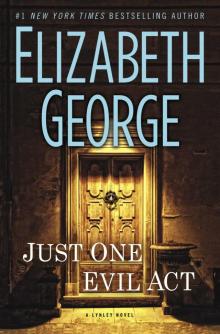 Just One Evil Act
Just One Evil Act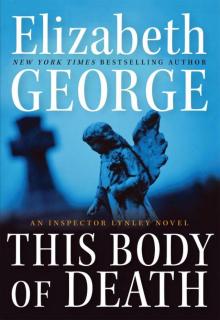 This Body of Death
This Body of Death The Edge of the Water
The Edge of the Water For the Sake of Elena
For the Sake of Elena Believing the Lie
Believing the Lie The Edge of the Shadows
The Edge of the Shadows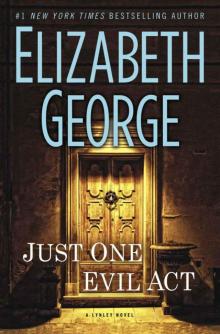 Just One Evil Act: A Lynley Novel
Just One Evil Act: A Lynley Novel In Pursuit of the Proper Sinner
In Pursuit of the Proper Sinner A Moment on the Edge:100 Years of Crime Stories by women
A Moment on the Edge:100 Years of Crime Stories by women Elizabeth I
Elizabeth I I, Richard
I, Richard A Traitor to Memory
A Traitor to Memory Missing Joseph
Missing Joseph A Suitable Vengeance
A Suitable Vengeance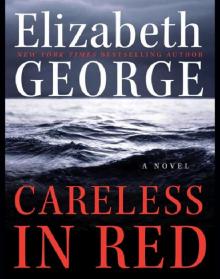 Careless in Red
Careless in Red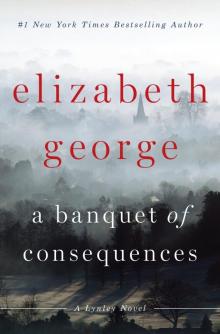 A Banquet of Consequences
A Banquet of Consequences Playing for the Ashes
Playing for the Ashes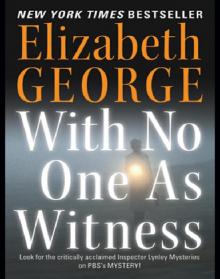 With No One As Witness
With No One As Witness Deception on His Mind
Deception on His Mind The Best American Mystery Stories 2016
The Best American Mystery Stories 2016 A Great Deliverance
A Great Deliverance In the Presence of the Enemy
In the Presence of the Enemy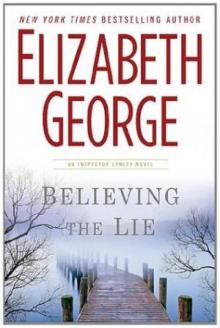 Believing the Lie il-17
Believing the Lie il-17 The Edge of the Light
The Edge of the Light SW01 - The Edge of Nowhere
SW01 - The Edge of Nowhere A Place of Hiding
A Place of Hiding What Came Before He Shot Her il-14
What Came Before He Shot Her il-14 Payment In Blood
Payment In Blood The Punishment She Deserves
The Punishment She Deserves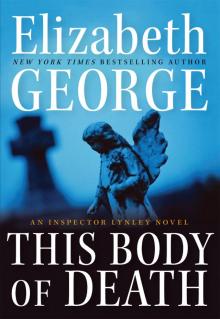 This Body of Death: An Inspector Lynley Novel
This Body of Death: An Inspector Lynley Novel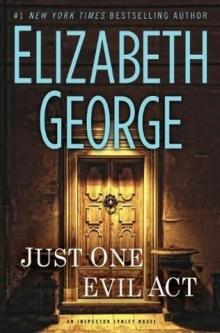 Just One Evil Act il-18
Just One Evil Act il-18 What Came Before He Shot Her
What Came Before He Shot Her Missing Joseph il-6
Missing Joseph il-6